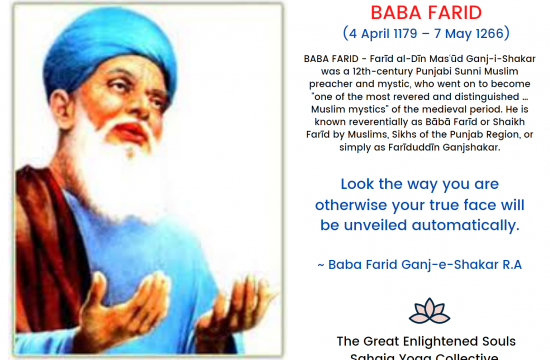Shaikh Nizamuddin Auliya, aka. Muhammad Nizamuddin Auliya – 1238 – 1325, also known as Hazrat Nizamuddin, and Mahbub-e-Ilahi (“Beloved of God”) was an Indian Sunni Muslim scholar, Sufi saint of the Chishti Order, and is one of the most famous Sufis from the Indian Subcontinent. His predecessors were Fariduddin Ganjshakar, Qutbuddin Bakhtiyar Kaki, and Moinuddin Chishti, who were the masters of the Chishti spiritual chain in the Indian subcontinent.
There was nothing to eat at home. His mother called out, “Nizamudin, today we are guests of God.”
Nizamudin put his head in her lap and smiled, “Why worry when we are guests of God”, and silenced his pangs of hunger and starvation.
In the evening of her life, she asked, “Nizam, at whose feet will you put your head next month?”
The heart torn Nizamudin enquired, “To whose care will you entrust me?”
Drawing her last breath, she held his right hand and entrusted it in God’s care, “O God, I entrust him to Thy hands.”
And the hand of God never left him. The hand of God guided him to the mud hut of his mentor Baba Farid who was nearing his ninetieth year. Baba Farid embraced him with a couplet,
“The Fire of your separation has burnt many hearts.
The storm of desire to meet you has ravaged many lives.”
The disciple had found his true master or was it the master who had found a true disciple….Two rivers confluence into an ocean of compassion. Under the tutelage of Baba Farid, Nizamudin attained his
self realization. He believed that no prayer or spiritual pursuit had greater value than comforting a distressed soul. One morning as he was strolling on his terrace he saw Hindus worshipping idols on the bank of the river Yamuna. He remarked to his disciples,
“You, who sneer at the idolatry of the Hindus, learn also from them how worship is done.”
His concern was to arouse the spirit of worship and not worry about the symbols. He did not prescribe extensive prayers or rituals but stressed the invocation from heart. “When one prays, one should think of His mercy alone. One should not brood over one’s past penitence nor past sins.”
His establishment was known for hospitality. He took personal care about courtesies extended to visitors, “First greet, then eat, then talk.” Food was served to visitors without discrimination. Bread was sent out as a token of blessings; it was difficult to find out who took food out of need and who as a token of blessings.
He never gave direct advice but taught by example. He learnt from his mother how to build the character with the power of love. According to the Chisti traditon, the greatest spiritual devotion which endeared man to God lay in, “river-like generosity, sun-like bounty and earth-like hospitality.”
The Sufis believe the ego to be the abode of strife and the spirit the source of peace. Strife multiples if ego is retaliated by ego whereas if the spirit responds to the one acting under the ego then the compassion dissolves the strife. He advised his disciples to be good to their enemies,
“If one man vents his wrath on another and the other remains patient, merit accrues to him who is patient and not the former.”
Rather than suppression of anger, Nizamudin suggested the path of forgiveness to dissolve anger. When it was reported that a certain person spoke ill of him, Nizamudin adviced his disciples to forgive and not harbor any ill will against that person. The one who repents his sin is to be considered equal to the one who has not committed any sin.
“He who is not my friend, May God be his friend.
He who bears ill-will against me,
May his joys in life increase.”
He steered his disciples towards compassion, forbearance and tolerance. His doors were always open to seekers of all faiths and he expanded the small Sufi order into a mass movement.
He avoided displaying any spiritual achievements, and regarded miracles as a screen obscuring reality. He led his disciples deep within to experience the joy of the spirit through introspection and meditation rather than discussion. He never allowed debates as he considered them only the noise of the ego.
Also they were discouraged from seeking seclusion, “live in the city as others live and bear the blows and buffets of the people.”
He did not curb their natural talents but harnessed them towards their ascent. For instance he elevated Amir Khusrau’s talent for lyrical poetry into spiritual emotion.
He followed his master’s advice and kept away from rulers and politics. He declined the request for an interview by the sultan of Delhi. The sultan held him in high esteem and offered some villages for his expenses but he politely declined. The Sultan then sent him one hundred gold coins which again he refused. After much insistence by the sultan he accepted one coin.
At eighty two he was persuaded to ascertain his last resting place. He said, “I am not worthy to sleep under any building. Bury me under the open sky.”
However, despite his will the sultan would not let his body rest in peace. He built a mausoleum with intricate marble slabs to clothe his body. But by clothing his body he could not touch his soul!
“Nizamudin was an emperor without throne or crown. But the sultan stood in need of the dust under his feet.”
Shaikh Muinudin Chisti





